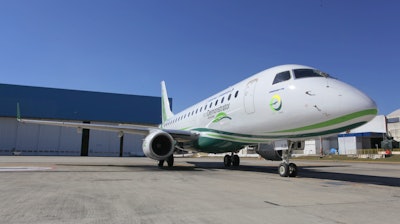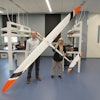
Boeing and Embraer yesterday unveiled the next phase of the Boeing ecoDemonstrator program. The program will test technologies to improve airplane environmental performance and accelerate their introduction into the marketplace.
An Embraer E170 will serve as the flying testbed and will feature advanced environmental technologies that will undergo operational testing in Brazil during August and September.
The ecoDemonstrator flights will test several technologies designed to reduce carbon emissions, fuel use and noise including:
- LIDAR (Light Detection and Ranging) technology using lasers to measure air data parameters such as true airspeed, angle of attack and outside air temperature.
- LIDAR shows potential to increase air data reliability by complementing current sensors, which could lead to further innovations that improve fuel efficiency and reduce carbon emissions.
- An "ice phobic" paint designed to reduce icing and help prevent accumulation of dirt and bugs due to its low adhesive property. The special paint can help operators save water by reducing the need for frequent aircraft washing.
- A new wing design with improved slats to reduce noise on takeoff and approach.
- Special sensors and air visualization techniques near the wing surface to better understand in-flight aerodynamics. This analysis could lead to further innovations to improve fuel efficiency and reduce carbon emissions, such as new wing designs.
- A Brazilian-produced biofuel blend made up of 10 percent bio-kerosene and 90 percent fossil kerosene, the maximum mixture according to international standards. Studies have shown that sustainably produced aviation biofuel emits 50 to 80 percent lower carbon emissions through its life cycle than fossil jet fuel.
The ecoDemonstrator tests illustrate Boeing and Embraer's continued investments to improve fuel efficiency and environmental performance of aircraft and meet the new carbon emissions standard announced by the International Civil Aviation Organization (ICAO) earlier this year.
The ecoDemonstrator collaboration expands a relationship that began in 2012 when Boeing and Embraer signed a cooperation agreement to benefit their customers, their companies and the global aviation industry.
Since then, Boeing and Embraer have supported Embraer's KC-390 defense aircraft program and improved runway safety by providing commercial customers with tools to reduce runway excursions. Last year Boeing and Embraer opened a joint biofuel research center in São José dos Campos to perform biofuel research and coordinate research with Brazilian universities and other institutions.






















